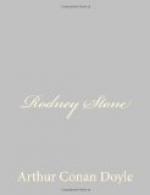His anxiety that the fight should be brought off was in such contrast to the zeal with which he had chased us from his county, that my uncle could not help remarking upon it.
“It is not for a magistrate to wink at the breaking of the law, sir,” he answered. “But if my colleague of Hampshire has no scruples about its being brought off within his jurisdiction, I should very much like to see the fight,” with which he spurred his horse up an adjacent knoll, from which he thought that he might gain the best view of the proceedings.
And now I had a view of all those points of etiquette and curious survivals of custom which are so recent, that we have not yet appreciated that they may some day be as interesting to the social historian as they then were to the sportsman. A dignity was given to the contest by a rigid code of ceremony, just as the clash of mail-clad knights was prefaced and adorned by the calling of the heralds and the showing of blazoned shields. To many in those ancient days the tourney may have seemed a bloody and brutal ordeal, but we who look at it with ample perspective see that it was a rude but gallant preparation for the conditions of life in an iron age. And so also, when the ring has become as extinct as the lists, we may understand that a broader philosophy would show that all things, which spring up so naturally and spontaneously, have a function to fulfil, and that it is a less evil that two men should, of their own free will, fight until they can fight no more than that the standard of hardihood and endurance should run the slightest risk of being lowered in a nation which depends so largely upon the individual qualities of her citizens for her defence. Do away with war, if the cursed thing can by any wit of man be avoided, but until you see your way to that, have a care in meddling with those primitive qualities to which at any moment you may have to appeal for your own protection.
Tom Owen and his singular assistant, Fogo, who combined the functions of prize-fighter and of poet, though, fortunately for himself, he could use his fists better than his pen, soon had the ring arranged according to the rules then in vogue. The white wooden posts, each with the P.C. of the pugilistic club printed upon it, were so fixed as to leave a square of 24 feet within the roped enclosure. Outside this ring an outer one was pitched, eight feet separating the two. The inner was for the combatants and for their seconds, while in the outer there were places for the referee, the timekeeper, the backers, and a few select and fortunate individuals, of whom, through being in my uncle’s company, I was one. Some twenty well-known prize-fighters, including my friend Bill Warr, Black Richmond, Maddox, The Pride of Westminster, Tom Belcher, Paddington Jones, Tough Tom Blake, Symonds the ruffian, Tyne the tailor, and others, were stationed in the outer ring as beaters. These fellows all wore the high white hats which were




